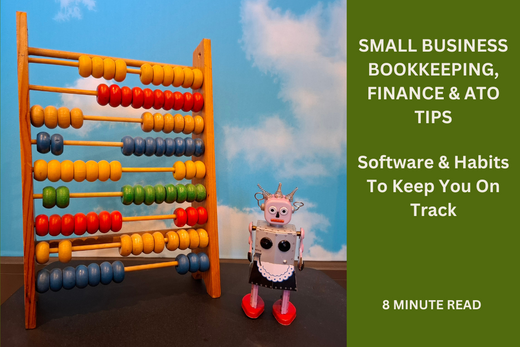Software & Habits To Keep You On Track
Your impulse to create and run your own show has driven you to set up your own business. How exciting!
You’re juggling customer service, recruitment, marketing, etc. but what about your bookkeeping and ATO compliance? Unless you're like us, it's not what you set out to do! It probably doesn’t give you a buzz. It can easily fall to the bottom of your to-do list.
Keeping on top of your number wrangling IS important though. It keeps your business running safely and smoothly, and actually saves you money in the long run.
This article explains how to set your business up with tax registrations, time-saving software, banking, employment systems and good habits. Whether your side hustle has suddenly picked up speed or your established business has been a bit freewheeling on the financial front, these practical tips will keep you on track!
Tax Registrations
The ATO is not just an entity you deal with once a year at tax time. It involves itself in businesses in many ways, and constantly. Your business may incur an array of reporting and payment obligations throughout the year, such as Goods & Services tax (GST), Pay As You Go Withholding (PAYGW) and Pay As You Go Instalments (PAYGI). The obligations that apply to you, and their reporting frequencies, will depend on your income and activity. We can assess that and make sure you’re correctly registered. Our blog post Small Business & The ATO provides an overview of how we can help.
Once you know your obligations, we recommend putting your estimated amounts payable aside as you earn income. For example, you could set up a bank account specifically for GST that keeps it separate from your usable income. Similarly, you should quarantine the PAYGW and superannuation components of your employees’ wages. Keep in mind that these funds are not YOUR money - They’re amounts you’re holding only temporarily until you forward them to the ATO or super funds. To spend them, assuming you'll have recouped them by the time you have to pay up, is risky business!
Bookkeeping Software
You should always have a grasp of your accounts receivable. That is, how much income has been billed, has been received, and is outstanding. Bookkeeping software enables you to track these stages. You can keep records in spreadsheets, but it’s more time-consuming and prone to human error.
Late payments affect your cash flow, so it’s also worth having a time-efficient plan for chasing up unpaid accounts. Electronic invoices can be set up with automatic reminder emails, and statements can be sent for overdue accounts. Often debtors just need a nudge, so let the robots do that before you spend time making awkward phone calls or writing emails.
In the other direction, you’ll need to monitor your accounts payable. That is, outgoings and liabilities such as supplies, rent, payroll, utilities, IT costs, loan repayments, etc. The more thoroughly you do this, the less likelihood there'll be of you receiving shock bills or being caught short without the cash to pay.
We recommend Xero, but there are many bookkeeping software brands on the market, available on monthly subscriptions. The time you save through automation usually more than makes up for the subscription fee cost. Good software also provides insights into your business health, as we’ll discuss below, so it’s well worth the investment.
Receipt-Capturing Software
Do you have a shoebox of receipts, a folder, a big envelope? How about some little paper rebels that have thwarted these ‘systems’ and eternally reside on your desk, in your bag or down the back of your couch? Are they going to assemble themselves come tax time? No, they won’t! You’ll find them months or years later, faded and indecipherable. Then you’ll feel the sting of these missed opportunities to save yourself money in deductions.
We use an app called Dext, which you install on your phone to take photos of your receipts. The data then flows into your bookkeeping software, making reconciling receipts seamless and paperless. Get in touch with us to have a chat about it.
Employment Software
Employing staff can supercharge your business, but you do need to make sure you stay on top of a whole raft of additional responsibilities. These may include PAYGW, payroll tax, superannuation, worker’s compensation insurance and Fair Work compliance. Our blog post Employer Responsibilities In Small Business provides an introduction.
An electronic payroll system is essential. You need to be able to maintain employee and payment data and, very importantly, Single Touch Payroll (STP). The ATO requires employers to transfer STP data at each payroll event.
All of Xero’s payroll subscription levels have STP capacity. We’re also fans of Employment Hero. It automates data flow across rosters, time sheets, leave calculations, pay runs and reporting, and it keeps users compliant with Fair Work. Check out our brochure on Employment Hero For HR & Payroll to see what it can do for you.
Banking
We strongly recommend setting up a separate bank account for your business, and being disciplined about not using your personal account for business transactions. A dedicated business bank account means you don’t need to wade through personal transactions to reconcile your business incomings and outgoings, thereby saving you time on bookkeeping. Furthermore, you’ll be able to link it directly to your bookkeeping software to set up reconciling automations. Again, let the robots do the work!
A business bank account also reassures clients that you’re legitimate, and presents you more professionally when applying for business loans or credit.
Cash Flow Forecasting
By capturing your receipts in software like Dext, and using bookkeeping software like Xero to reconcile your receipts and invoices against your dedicated business bank account, you have data at your fingertips to generate valuable insights.
A cash flow forecast is a magnificent tool to aid your business! Based on your history of income and expenses, a cash flow forecast enables you to see weeks or months ahead into your likely financial future. It mitigates your risk of not being able to pay bills, make purchases or cover leave liabilities when you need to. You can also use it to plan ahead for expansion or to estimate the buffer you might need to navigate unexpected downturns.
We recommend checking your cash flow on a weekly basis, but it can be done fortnightly or monthly. We can help you set up a cash flow forecast tailored to your business.
Engagement
Be diligent in regularly allocating time to engage with the financial side of your business.
If your accounts are a DIY affair, set aside time each week to send invoices, chase payments, pay bills and reconcile your bookkeeping software against your bank transactions.
If you outsource to a bookkeeper or accountant, you still need to pay regular attention to your financial health. Check your cash flow forecast. Track your budgets. Assess whether your income is enough to sustain you personally, as well as enough to keep the business functioning, or even enough to allow you to seize opportunities for growth.
Guidance
Engage a professional to set up your bookkeeping software. Even if the software is user-friendly, there are practices and procedures that need to be built in correctly at the outset.
If you do your bookkeeping yourself, undertake training and have a consultant review your work regularly. You need to be sure that you’re reconciling transactions in a consistent and correct manner, and that you’re keeping up to date with changes to business regulations.
If you’re happy to outsource your bookkeeping, let’s differentiate between bookkeepers and accountants: Accountants usually charge a much higher rate than bookkeepers, so there’s money to be saved in opting for a bookkeeper to help with invoicing, reconciling, financial statements, and BAS, IAS and PAYG lodgements (if they're a registered BAS agent).
With your books in a good state, you can then hand them over to an accountant at tax time. They can use their eagle eye to discover deductions and lodge your tax return.
Counting Clouds provides bookkeeping, accounting and consulting services that you can mix and match at your discretion. You can read all about what we do or book an Hour Of Power session or have a chat with us at any time via help@countingclouds.com.au




